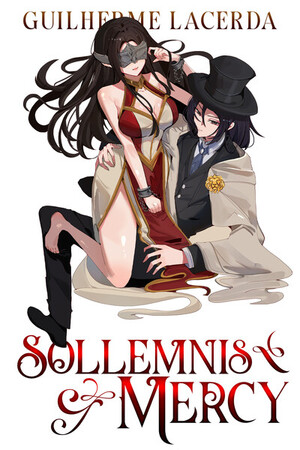Chapter 8:
Beneath the Mantle of Civility
Solemnis Mercy
A guard stopped them at the gates of the Senatorial Ring.
“Halt!” barked the soldier, his expression stern, as he watched them dismount from a rickshaw pulled by a Stony slave. “Identify yourselves!”
In the shadow of the black stone walls —more than twelve meters high — that separated the Senatorial Ring from the rest of the city, the man clad in segmented plate armor over a red tunic was scrutinizing all who wished to enter the wealthiest district of the Gran-Devana. By law, only nobles could reside there, and both the lords of the Great and Minor Houses had free access through the gates.
The same could not be said for common citizens. Even the wealthy industrialists of the Middle Ring, who financed the aristocracy’s political campaigns, could only enter with special permits. Let alone the common folk, whose service licenses were reluctantly renewed on a daily basis, only for the maintenance of essential services to the comfort of the highborns.
By public order, Daniel and his companions were not allowed to travel through that district. A hindrance to their goal.
Fidenzio Crisci de Lio, on the other hand…
“What an outrage!” Thanatos protested, stepping forward to block the guard. “How dare a mere soldier of the Custodia Civilis deny passage to Lord Fidenzio Crisci of the noble House de Lio?”
The pompous name thundered with authority in the artist’s booming voice, making the guard step back, uncertain. Beside him, another man-at-arms with a clean-shaven face flipped frantically through a genealogical registry, likely searching for any mention of House de Lio.
“What’s going on, herald?!” Daniel demanded, pitching his voice up an octave to lend credibility to the fool’s pantomime. “I’ve traveled a long way from Doreagate to the capital. I don’t wanna waste more time to look for an inn.”
The stern-faced guard gripped the hilt of a gladius at his waist until his knuckles turned white.
“One moment…” he asked, casting an anxious glance at his colleague. “We’re still verifying your House.”
“I’m not sure if aristocratic Houses from other cities are listed in the registry, Aenius” the second guard whispered in reply.
Grace heard the exchange, thanks to one of his Gift’s skills — and it was all he needed.
“Outrageous! How dare you suggest that the noble House de Lio has no place in the Senatorial Ring?”
“What?!” the man examining the book flinched, nearly dropping the tome. “That’s not what I meant, milord!”
The soldiers hesitated.
“Don’t worry, Lord de Lio” soothed the one still clutching his gladius. “Lisenus will add your name to the book, and we’ll send a formal notice to the Heraldic Autarchy, requesting full registration of House de Lio in the Custodia Civilis archives.”
“That will suffice for now…” Daniel muttered, letting the bluff hang in the air while tapping his cane against the pavement with feigned impatience. “Record my name and that of my retinue: a herald, a tutor, and a bodyguard.”
Stomping ahead, Grace left the soldiers to their paperwork, and the other three followed. A few blocks later, Thanatos let out a chuckle.
“Well played, Master de Lio! That alibi should buy us a few days.”
Daniel shrugged.
“It was your idea. Besides, I doubt they’ll even send the request — at least not unless my name draws attention. That level of bureaucratic commitment isn’t typical of low-ranking guards.”
“And if your name does draw attention?” Gupta asked, hurrying his pace to keep up.
“Then let’s hope the Princeps prepared more than just a name and a coat of arms for my supposed family.”
***
There was rot at the heart of the Empire.
Not the kind he’d found at Dragon’s Wharf. He half-smiled — no foul odors or public indecency here.
Daniel drummed a finger on his cane. A man with his skills could sense what was putrid beneath the high-pedimented buildings and ornate arcades.
In that regard, there was little difference between rich and poor.
Thanatos led them down wide, well-planned streets, where rickshaws and horse-drawn carriages — some pulled by automaton horses — glided over polished black cobblestone. The facades of residences and public buildings featured visible machinery — gears and copper ducts — through which steam from underground boilers passed, expelled by large marble chimneys.
Yet the light that bathed the thirty-story senatorial towers — raised on steel-reinforced foundations and connected by hydraulic elevators — cast a terrible shadow upon the Empire’s heart.
Slaves.
Daniel noticed, pretending to admire the beauty of the Great Houses’ power monuments, their upper levels reserved for noble residences, as any country nobleman would.
Humans, mostly. Bought by aristocrats to work the lower levels of the towers: in arsenals, kitchens, offices, and stables. The only commoners allowed to reside in the Senatorial Ring — not as citizens, but as property.
Among the towers were suspended plazas and elevated patios with hanging gardens, maintained by automatic irrigation engines. Watched over by the Custodia Civilis, these spaces hosted diplomatic meals, honor duels, and informal events like art and science exhibitions.
Chapels dedicated to the Orthodox gods were carefully preserved in niches, tended by vestal priestesses under the service of the Pontifex Maximus. Their mosaics, lit by gas lamps, attracted ever-dwindling attention to a fading faith.
An undeniably magnificent structure — maintained on the backs of a race with no choice but to serve. The most unpleasant tasks of the Senatorial Ring fell to the Stonelings.
Humanoids over two meters tall, with massive muscles beneath gray, stone-like skin. In place of eyebrows, they had rocky ridges, and their small eyes were dark as basalt.
They wore only the rags their masters graciously gave them, and so their petrified growths — jutting from their bodies in many hues: the red of hematite, the green of chlorite, the white of quartz, the ochre of limestone — were always visible. Despite their appearance, they were a peaceful race and, according to what Daniel had read in Historia Imperii by the scholar Deca Piusalla, had already been slaves in the Khurutas satrapies even before the imperial conquest.
A convenient excuse to keep a servile people in chains, willing to perform every task we ourselves don’t want.
For some time, Daniel had distracted himself with his training — exploring the limits of his Gift and learning more about Ordinem Finis. Recently, however, he’d reflected on the Princeps’ words about the Convergence and about the youthful reasons that had brought him to that world in the first place.
Most of all, the desire to seize the reins of his own fate — and turn his back on death. As he crossed the center of the Ring, Daniel pondered whether things on Earth were truly better than on the Grand Continent.
Six towers crowned a chimeric marble structure adorned with brass and oxidized copper detailing, accessible by a single fortified bridge. The Imperial Senate.
Spanning six city blocks, its central glass dome allowed light into the Hall of Audiences, where senators signed edicts and decrees under the watch of automatic stenographers. The brilliant construction — lit by thaumaturgic lights hidden beneath its columns — maintained a constant temperature and purified ventilation, Daniel had heard, and also served as the residence of the First Citizen.
Absolute power…
Maintained by the alienation of thousands — perhaps millions — of souls, incapable of grasping the true meaning of their lives.
His destiny, however… lay further ahead. At the Devanic Coliseum — built of steel and limestone, with more than 150 meters in diameter and five levels of seating, capable of housing up to sixty thousand spectators.
An impossible audience, even if every noble in the Empire were summoned to the Senatorial Ring.
Its external façade featured spiraled columns reinforced with ornamented bronze panels, hiding hydraulic systems that regulated mechanical effects and climate control during performances. As they passed through the Coliseum’s half-open steel gates — guarded by two sphinxes with lion bodies and women’s heads — the group made their way to the lower seating levels and got a good look at the arena.
Covered with modular plates, it could be adapted for various types of spectacle: gladiatorial duels, historical battle simulations, circuses, and musical concerts, complete with beasts, weapons, and moving platforms stored in tunnels below.
“What are we doing here, Thanatos?” Daniel asked, settling into a seat.
“Once a week, up until election day, the consular candidates participate in public debates in the Coliseum” the artist explained with a shrug. “I figured this would be a good chance to observe both our allies and the opposition, Master de Lio.”
Grace looked around, satisfied with the fool’s foresight in anticipating his wish to witness such an important event. A few hundred high magistrates, bureaucrats, and other citizens from the upper layers of the imperial hierarchy were gathered to attend the debate.
Servants, trained in all manner of domestic duties, attended to the highborns as they whispered and giggled over their petty politics — unaware of the danger the Swords posed to their idle way of life.
Evaluating the four candidates in the arena’s center, Daniel finally recognized a familiar face. Lord Juncuso was one of the senators running for the Coins.
But something was off. While the Swords sat comfortably listening to a question from a round-faced industrialist in a black coat, thick mustache, and top hat, Juncuso had a clenched jaw and furrowed brow. His ally — a bald, chubby senator with a red face — looked strangely vacant.
The answer, however, came swiftly.
[A mundane is attempting to penetrate your mind using a thaumaturgic art. The skill level is high, but you manage to resist.]
Standing abruptly, Daniel looked around, startled.
“Someone is using magic to influence the debate!”




Please sign in to leave a comment.